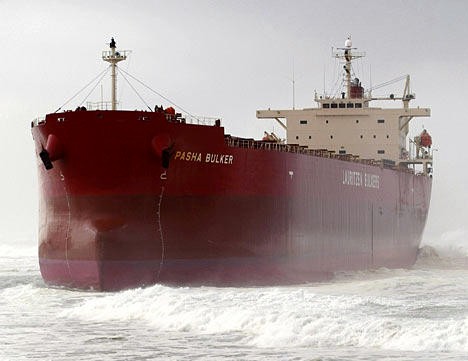Tugs prepare for Pasha Bulker salvage
by Rob Kothe on 22 Jun 2007

Pasha Bulker Powerboat-World.com
http://www.powerboat-world.com
The 225 metre long 40,000 tonne bulk carrier Pasha Bulker grounded near the entrance to Newcastle Harbour on Friday June 8th when she has hit by heavy seas. One of sixty bulk carriers waiting to load coal from Australia’s major bulk coal seaport, she had been anchored three miles offshore, she lifted her anchor and attempted to head seawards when the strongest East Coast Low in 30 years produced huge seas.
The carrier was not able to move seawards because of the force of the 8-12 metre waves and she ran aground 50 metres off the beach near Big Ben reef, just south of the Newcastle Port entrance.
The 22 man crew had to be rescued by helicopter and over the next 48 hours massive waves crashed into and over the ship and the bow swung towards Nobbys Beach, near the Newcastle Baths.
Newcastle Port Corporation and maritime authorities are continuing preparations to re-float the stranded Pasha Bulker at the end of this month, with the building spring tides.
The NSW Ports Minister Joe Tripodi said yesterday.’ The situation confronting the salvage team remains serious, although the Pasha Bulker is currently standing up well to the weather and heavy seas off the coast.
'Following extensive discussions with the salvage team and Newcastle Port Corporation however, I’m advised there remains risk of an oil spill during both the preparation for and the refloating attempt from Nobbys Beach. Air surveillance has not observed any oil around the Pasha Bulker to date.
'This is not a routine exercise - refloating a 40,000 tonne bulk carrier is a difficult task, made more complex by the breach in the vessel’s outer hull. '
'Two salvage tugs, Woona and Keera, will be used in the salvage efforts and a third tug from Cairns, the anchor-handling vessel Pacific Responder has now arrived in Newcastle.
'Newcastle Port Corporation CEO Gary Webb Newcastle Port Corporation is prepared for the realistic chance that despite the detailed planning and best efforts of the salvage team to transfer fuel to higher and safer compartments in the ship, some residue oil could remain in the tanks,' he said.
Webb said a water exclusion zone came into force at 6am today and marker buoys would be deployed to identify the area.
'We are still progressing on a hydrographic survey but swell conditions may mean this is not completed until early next week,' he said.
The Shoreside Salvage Master for Svitzer Salvage, Drew Shannon, said his team still had much preparation to undertake despite the Pacific Responder arriving from Queensland yesterday.
'We hope to start laying anchors off-shore either later today or early tomorrow,' Mr Shannon said.
'The anchors will be laid about 400 metres off the Pasha Bulker. Wire cables running from the anchors will be fed to the ship to enable on-board winches to assist with the attempt to refloat the vessel.
'The salvage tugs will have tow lines connected to the ship in a safe and timely manner to also assist in the attempted refloat,' Mr Shannon said. Mr Shannon said the salvage team was on target to carry out the refloat plan at the end of the month when spring tides arrive in Newcastle.
'The plan is to maintain maximum safety for the salvage team onboard at all times,' he said. 'The plan is flexible, allowing us to respond to differing situations and circumstances.
'An attempt to refloat will not commence until we have completed all necessary steps to ensure we give ourselves the best chance of success. Time frames cannot be given or assumed and we ask for patience as we carry out our plan.
'Everyone involved in this operation is professional, we are focussing on the job at hand and striving for a good outcome,' Mr Shannon said.
'Personnel from more than 20 agencies are preparing equipment necessary for any response. 'Incident control and oil spill teams are already on stand-by and remain on full alert to respond immediately should there be an oil spill of any nature,' Webb said.
'Any potential oil spill response will be three-pronged - a combination of contaminant recovery, the possible use of dispersants and a shore-line clean up. The oil spill response vessel Shirley Smith is presently in Newcastle, where it will remain on call.
'Contingency plans have also been developed to deal with a situation of oil entering the Hunter River or being deposited on Stockton Beach.
'Oil response and salvage equipment gathered from across the country has been moved to the forward-staging area, ready to be deployed if an incident occurs,' Webb said.
If you want to link to this article then please use this URL: www.sail-world.com/34793